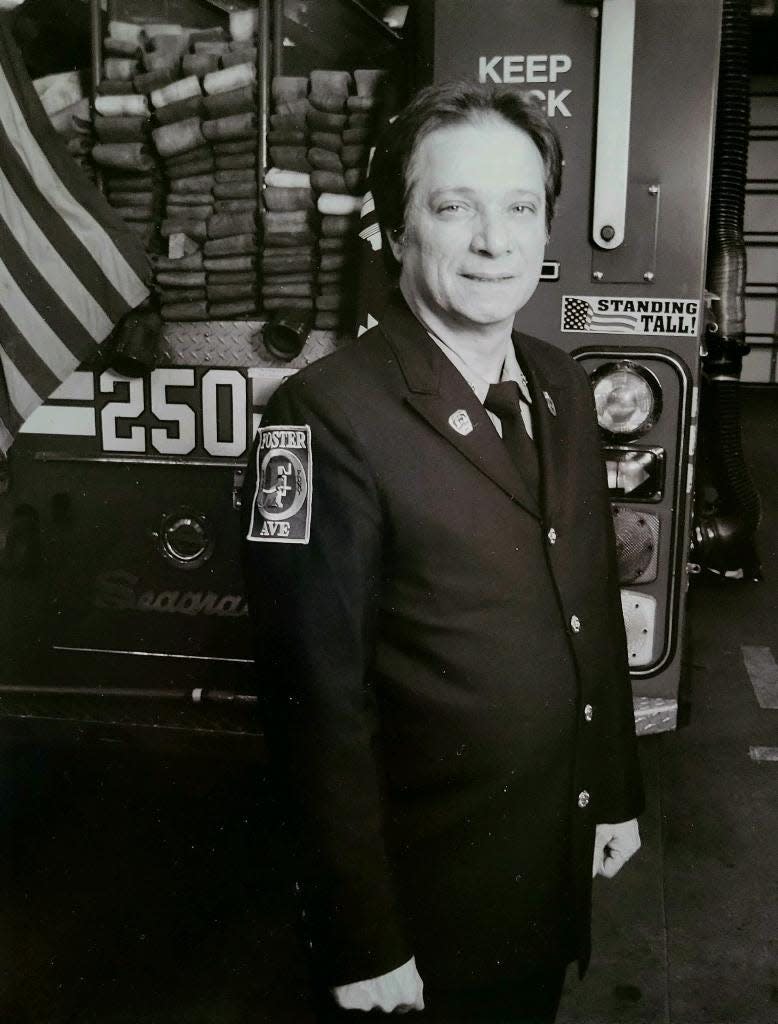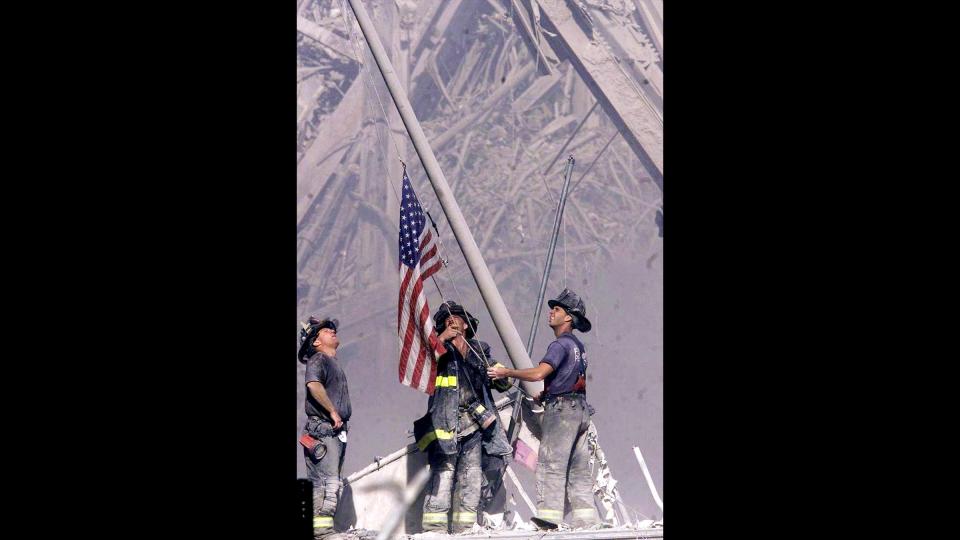'Astounding' milestone: We cannot forget FDNY's 9/11 sacrifice — then and now | Kelly
The numbers tell us everything.
On Sept. 11, 2001, 343 New York City firefighters perished when the twin towers of the World Trade Center in lower Manhattan collapsed into a massive rubble pile and clouds of smoke.
It was the worst terrorist attack in American history. Indeed, the 343 deaths — murders actually — were the highest death toll in a single day by any fire department in the history of the world.
But, incredibly, the tragedy of the 9/11 attacks worsened. And on Sept. 23, that story reached a horrific milestone. Firefighter Robert Fulco died.
Fulco was the 343rd FDNY member to die since Sept. 11, 2001 of health-related problems from the toxic air he breathed when he responded to the trade center site in the aftermath of the attacks.

That’s 343 taken on the day of the attacks and another 343 taken since then. And the numbers will inevitably grow, health officials say.
And so will the cloak of sadness that still clings to the 9/11 attacks. Or as New York City Fire Commissioner Laura Kavanagh noted after Fulco’s death: “We have long known this day was coming, yet its reality is astounding just the same.”
The long aftermath
Robert Fulco was 73 and retired for two decades from his firefighting job at Engine 250 in Brooklyn.
On 9/11, he responded to the "general alarm" call of all firefighters to somehow get to the trade center. Afterward, Fulco kept going back, searching for possible survivors or the remains of the dead in the seven-story pile of twisted steel and pulverized concrete.
Like so many who flocked to the site, Fulco breathed the bad air, not realizing that the toxins he inhaled would later tear into his lungs.
343 more deaths: Deaths of FDNY responders from 9/11-related illnesses reach 'somber' milestone
Eventually, he was diagnosed with pulmonary fibrosis. Essentially, his lungs were so badly scarred that he couldn’t breathe on his own. In his final years, he needed an oxygen tank by his side.
The tick-tock of firefighters’ deaths is just the tip of this horror story, however. Yes, 2,977 people died when Islamist terrorists from Osama bin Laden’s al-Qaida network crashed two highjacked commercial jetliners into the World Trade Center in New York City, another jetliner into the Pentagon and a fourth into a farm field in Pennsylvania.
But since that day, more than 2,500 people have also died from the variety of cancers, lung problems and other health issues traced to the toxic clouds that billowed and then lingered in lower Manhattan after the 9/11 attacks, according to the Centers for Disease Control and Prevention.

Most of these post-9/11 victims — about 1,650 — were police officers, firefighters, construction workers and other first responders who combed through the rubble in the weeks after the attacks. Some dug with their hands. Others used rakes. When they found any bodies — or pieces of bodies — all work stopped at the 16-acre site and the workers covered what they found with an American flag and then carried the remains up a ramp and to a mortuary.
Yes, the air was bad. It stunk of death and burned rubber, plastics and other construction materials. Yet, our government officials — notably Christine Todd Whitman, the former New Jersey governor who was then the head of the U.S. Department of Environmental Protection — told everyone the air was just fine. So the responders kept digging — and breathing.
In the years that followed, many of these workers were diagnosed with all manner of cancers, heart diseases and other ailments. The cause: they simply breathed too much of that toxic air for too many days.
Mike Kelly: Here's the NJ backstory to Iran prisoner swap: It's all about 'frozen' assets
Who else has been impacted?
Besides the 343 members of the fire department, another 856 people who worked, lived or went to school in lower Manhattan near the site have also died from the same health problems, the Centers for Disease Control and Prevention says.
As if that’s not enough, some 17,000 of those police, firefighters and construction workers who labored at the trade center site for nearly a year have been diagnosed with cancer. And another 14,000 workers, residents and students from the area now also have cancer.
That means the death toll is probably going to rise.
About 130,000 people are now enrolled in the federally financed World Trade Center Health Monitoring Program. Full disclosure: This columnist, who reported from Ground Zero for months, is one of them.
Each year, we are invited to one of the major area hospitals for blood tests, chest X-rays, breathing exams — the whole gamut of possible problems. Even psychologists are on duty to help those suffering from post-traumatic stress disorder or memory loss.
Most of us are doing OK. But to walk into the waiting room on exam day is to discover how wide a swath of our nation has been affected.
Electricians sit with TV technicians, teachers with cops, clerics with hot dog vendors. The rich and the poor. All races, ages, genders, occupations and backgrounds. Simply put: It’s a look into the diverse American melting pot.
But the experience also inevitably conjures up a horrific fear. Even for those of us who pass these health exams with flying colors, it’s impossible not to gaze around the waiting room and wonder who might get sick next.
It’s all too easy to turn this post-9/11 legacy into a story of terrible numbers. After all, the numbers themselves are shocking.
But it’s more important to remember that each death is, in itself, a story of service that ended with tragedy that should never have happened.
Mike Kelly: Did 9/11 memories fade due to Saudi money? For one PGA official, they may have
We must remember
Three days before Robert Fulco became the 343rd New York City firefighter to die of post 9/11 health problems, Hilda Vannata died after battling a pancreatic cancer that swept into her body after she worked in the toxic ruins of the trade center helping to recover the dead. She was 67 and had served for 26 years as one of the fire department’s Emergency Services Technicians, based with Battalion 14 at Lincoln Hospital in the Bronx.
She was the 342nd member of the fire department to die of post 9/11 health problems. Her obituary described her as the “life of the party.” And to her son, Andy, now a sergeant in the New York City police department, she passed on this advice: “You can’t put a price tag on peace of mind.”
Robert Fulco joined the FDNY in 1977, and battled fires for 25 years before leaving the department in August 2002 — less than a year after the 9/11 attacks.
The lung problems quickly surfaced. But Fulco was told he was too old to receive a lung transplant. His obituary said that he still tried to attend New York Rangers hockey games as much as possible. He volunteered with the Roman Catholic Knights of Columbus. And he delighted his family with his culinary skills, some of which he learned by cooking at his firehouse.
These are just a few of the small but uniquely significant details of the lives of those we have lost to 9/11.
Let’s not forget them.
Sadly, there will be more to remember in the coming years.
Mike Kelly is an award-winning columnist for NorthJersey.com, part of the USA TODAY Network, as well as the author of three critically acclaimed non-fiction books and a podcast and documentary film producer. To get unlimited access to his insightful thoughts on how we live life in the Northeast, please subscribe or activate your digital account today.
Email: kellym@northjersey.com
This article originally appeared on NorthJersey.com: FDNY 9/11 deaths reach 'astounding' milestone, 20 years later

